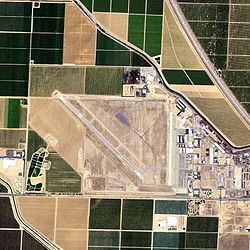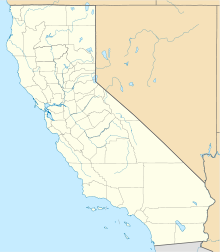| Shafter Airport Minter Field | |||||||||||||||
|---|---|---|---|---|---|---|---|---|---|---|---|---|---|---|---|
 USGS 2006 orthophoto USGS 2006 orthophoto | |||||||||||||||
| Summary | |||||||||||||||
| Airport type | Public | ||||||||||||||
| Owner | Minter Field Airport District | ||||||||||||||
| Serves | Shafter, California | ||||||||||||||
| Elevation AMSL | 424 ft / 129 m | ||||||||||||||
| Coordinates | 35°30′21″N 119°11′30″W / 35.50583°N 119.19167°W / 35.50583; -119.19167 | ||||||||||||||
| Website | www.MinterField.com | ||||||||||||||
| Map | |||||||||||||||
 | |||||||||||||||
| Runways | |||||||||||||||
| |||||||||||||||
| Statistics (2011) | |||||||||||||||
| |||||||||||||||
| Source: Federal Aviation Administration | |||||||||||||||

Shafter Airport (IATA: MIT, ICAO: KMIT, FAA LID: MIT), also known as Minter Field and formerly known as Air Corps Basic Flying School, is a public use airport located four nautical miles (7.4 km; 4.6 mi) east of the central business district of Shafter and 14 miles northwest of Bakersfield, a city in Kern County, California, United States. Originally a World War II primary training facility for pilots, it is currently a public airport owned by the Minter Field Airport District. This airport is included in the National Plan of Integrated Airport Systems for 2011–2015, which categorized it as a general aviation facility.
History

Lerdo Field, as the airport was initially known during World War II, was first opened in June 1941 when the United States Army Air Corps (USAAC) dispatched a small garrison of airmen to open an airfield at Shafter.
The name was derived from close proximity to the highway of the same name. The airfield commander utilized Bakersfield College as his headquarters, while airmen were quartered in temporary facilities from Bakersfield to Wasco while barracks and other structures were being built. As construction proceeded through the rest of the year, the Minter Sub-Depot was established as a branch of the Sacramento Air Depot.
In August, the first operational training units (OTUs) began arriving at Lerdo Field, the airfields mission being advanced pilot training of USAAC bomber, attack, transport and pursuit pilots. In April 1942, contracts for the construction of more than 65 on-base buildings were let, while the constantly increasing numbers of cadets were housed in a large tent city erected as temporary shelter.
With the relative completion of construction in July 1942, the airfield was renamed Minter Field Army Airfield after a member of the locally prominent Minter family, First Lieutenant Hugh C. Minter. Lieutenant Minter, a World War I veteran, was killed in a mid-air collision over March Field on July 8, 1932. The airfield was placed under the overall command of the United States Army Air Forces West Coast Training Center. Known sub-bases and auxiliaries of Minter Field were:
- Wasco Auxiliary Airfield (No.1) – 35°37′12″N 119°21′14″W / 35.62000°N 119.35389°W / 35.62000; -119.35389 (Wasco Auxiliary Airfield) now Wasco-Kern County Airport
- Pond Auxiliary Field (No. 2) – 35°42′36″N 119°20′59″W / 35.71000°N 119.34972°W / 35.71000; -119.34972 (Pond Auxiliary Airfield) – abandoned
- Famoso Auxiliary Airfield (No.3) – 35°38′28″N 119°12′43″W / 35.64111°N 119.21194°W / 35.64111; -119.21194 (Famoso Bakersfield Auxiliary Airfield) – abandoned
- Dunlap Auxiliary Airfield (No.4) (AKA Jasmin Landing Field) – 35°44′37″N 119°08′37″W / 35.74361°N 119.14361°W / 35.74361; -119.14361 (Dunlap Auxiliary Airfield) – abandoned
- Semi-tropic Auxiliary Airfield (No.5) – 35°45′25″N 119°30′45″W / 35.75694°N 119.51250°W / 35.75694; -119.51250 (Semi-tropic Auxiliary Airfield) – abandoned
- Poso Auxiliary Airfield (No.6) – 35°35′48″N 119°08′01″W / 35.59667°N 119.13361°W / 35.59667; -119.13361 (Poso Auxiliary Airfield) now Poso Airport
- Lost Hills Auxiliary Airfield (No.7) – 35°37′27″N 119°41′15″W / 35.62417°N 119.68750°W / 35.62417; -119.68750 (Lost Hills Auxiliary Airfield) now Lost Hills Airport
- Coalinga Municipal Airport (Old) (closed) – 36°09′27″N 120°21′35″W / 36.15750°N 120.35972°W / 36.15750; -120.35972 (Coalinga Municipal Airport (Old))
The primary aircraft flown at Minter Field was the Vultee BT-13 Valiant, which was used for f flight training. Other training aircraft included the Cessna UC-78 Bobcat, AT-6 Texan advanced trainer, North American B-25 Mitchell twin-engine medium bomber, and Lockheed P-38 Lightning, as well as other widely used fighter, bomber and observation craft.
With the end of the war in 1945, the airfield was determined to be excess by the military and turned over to the local government for civil use in March 1948.
The Gossamer Condor piloted by Bryan Allen won the first Kremer prize on August 23, 1977, by completing a figure 8 course specified by the Royal Aeronautical Society at Minter Field. California Historic Landmark #923 is located at the field to commemorate this event.
Facilities and aircraft
Shafter-Minter Field covers an area of 1,206 acres (488 ha) at an elevation of 424 feet (129 m) above mean sea level. It has two runways: 12/30 is 4,501 by 100 feet (1,372 by 30 m) with an asphalt surface; 17/35 is 2,970 by 100 feet (905 by 30 m) with a concrete surface.
For the 12-month period ending November 1, 2011, the airport had 45,000 general aviation aircraft operations, an average of 123 per day. At that time there were 114 aircraft based at this airport: 77% single-engine, 8% helicopter, 7% ultralight, 4% jet, and 4% multi-engine.
See also
- California World War II Army Airfields
- 35th Flying Training Wing (World War II)
- List of airports in Kern County, California
References
- ^ FAA Airport Form 5010 for MIT PDF. Federal Aviation Administration. Effective May 31, 2012.
- ^ Salley, Harold E. (1977). History of California Post Offices, 1849-1976. The Depot. p. 142. ISBN 0-9601558-1-3.
- The field was "2011–2015 NPIAS Report, Appendix A" (PDF, 2.03 MB). Federal Aviation Administration. October 4, 2010.
- Thole, Lou (1999), Forgotten Fields of America : World War II Bases and Training, Then and Now - Vol. 2. Publisher: Pictorial Histories Pub, ISBN 1-57510-051-7
- "Welcome to the Museum". Minter Field Air Museum. Retrieved October 1, 2017.
- "Minter Army Airfield History". Minter Field Air Museum. Archived from the original on July 25, 2008. Retrieved April 20, 2008.
- "CHL No. 923 Flight of the Gossamer Condor - Kern". California Historic Landmarks. Retrieved October 1, 2017.
Other sources
 This article incorporates public domain material from the Air Force Historical Research Agency
This article incorporates public domain material from the Air Force Historical Research Agency- Manning, Thomas A. (2005), History of Air Education and Training Command, 1942–2002. Office of History and Research, Headquarters, AETC, Randolph AFB, Texas OCLC 71006954, 29991467
- Shaw, Frederick J. (2004), Locating Air Force Base Sites, History’s Legacy, Air Force History and Museums Program, United States Air Force, Washington DC. OCLC 57007862, 1050653629
External links
Map all coordinates using OpenStreetMapDownload coordinates as:
- Shafter Airport/Minter Field, official site
- Minter Field Air Museum
- Aerial image as of September 1994 from USGS The National Map
- FAA Terminal Procedures for MIT, effective December 26, 2024
- Resources for this airport:
- FAA airport information for MIT
- AirNav airport information for KMIT
- ASN accident history for MIT
- FlightAware airport information and live flight tracker
- SkyVector aeronautical chart for KMIT
| Flying training |
|  | ||||
|---|---|---|---|---|---|---|
| Technical training | ||||||